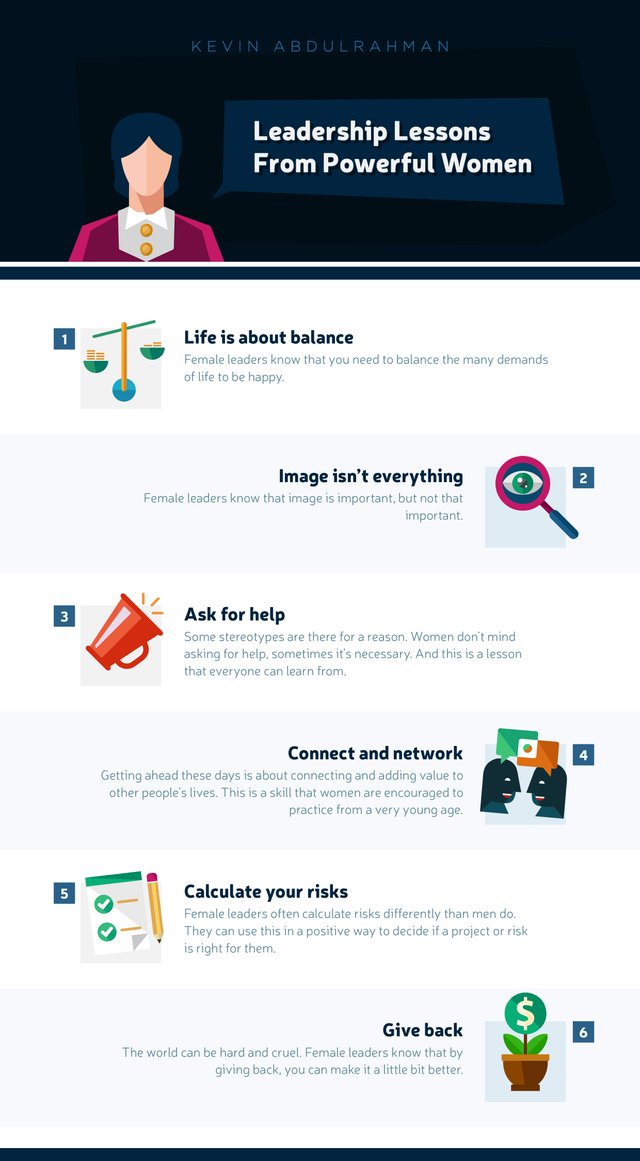Leadership Lessons from Powerful Women

So often when we learn about leadership, it’s from men. It’s a fact that the most powerful people in the world are men. Plus, more men are in leadership roles than women by a large amount. But that doesn’t mean that there’s nothing we can learn about leadership from powerful women in the world.
Women such as Melinda Gates, Sheryl Sandberg or Michelle Obama can serve as examples of what women can do with a vision and the right drive. They can inspire other women, and men, to go after their dreams. And their examples can offer new lessons on what it takes to be a leader.
What lessons can powerful women teach us about leadership? And what lessons can we learn from them that we can’t learn from men?
Life is about balance
Female leaders are much more likely to try to balance the different parts of their life. Unfortunately, there is a stereotype in business that you have to be ‘all work and no play’ to be successful. This is an unhealthy and often miserable way to live a life. Women in leadership such as Arianna Huffington are trying to show people a different way.
The once founder and editor of the Huffington Post has dedicated her life to improving people’s health and overall wellbeing since leaving the Huffington Post. Through her writing, she tries to show people how to live more balanced and healthy lives, with better sleep and fewer negative working habits. She learned these lessons in her years at the Huffington Post, which left her exhausted and burned out, and now tries to be an example of a better way.
Image matters (but not that much)
It seems to be a fact that a woman in a leadership position is criticized more for her looks than a man would be in the same position. Michelle Obama worked to encourage healthier eating for all children, but social media was often more interested in commenting about her broad shoulders.
This trend is unsettling, but unlikely to go away any time soon. It means that women in leadership must learn to find the balance between caring about their image, and dismissing people who are overly concerned with it. This applies to all women in business. There will always be people who criticize a women’s appearance or clothing in a professional context. The key is to ignore it, and push forward.
Ask for help when you need it
It’s a stereotype for a reason. Men don’t like to ask for help. But when you’re a leader, whether it’s of a company or a country, you can’t afford to have that attitude. It can lead to chronic overwork, incorrect decisions, and a lack of trust and cohesiveness in your team. These can all be devastating to the success of your business.
There is no clear reason why men prefer not to ask for help, although there is a lot of speculation. But whatever the reason, women don’t seem to have this block, and are more likely to ask for help when it’s needed. This trait can help them address and solve problems as soon as they arise, guide them in redirecting a business that has gone off course, and help them to avoid potential problems.

Connect and network
This is another stereotype that has its roots in the truth. Women have a tendency to be more interested in social connections than men. They like to talk and are usually better at reading and understanding social cues. This can and has given them a huge advantage in today’s overly connected network.
Oprah Winfrey is one woman who offers a great example of how this can work. Not only did she make her fame and fortune talking to other people, she now uses her power and connections to connect with other people and bring them into the lime light. Her life and success are prime examples of how connecting with others can bring success as well as support from others.
Calculate your risks
There is some evidence that men and women evaluate risks differently. Studies show that women are less likely to engage in risky behavior, and will usually back down from a perceived threat faster than men do. This difference may have an evolutionary basis, as the tendency could have helped with group survival. But it can also be a benefit in the business world.
A lower tolerance for risk and a more cautious approach to analyzing risk can be a great benefit in business. It can help you to avoid costly mistakes, and give you a different view on problems and opportunities. It can also help you to understand when a risk really is worth taking, regardless of the potential pitfalls. Managed properly, this tendency could be of great benefit to any business leader, and particularly to women in leadership positions.
Give back whenever you can
This is not unique to women in leadership positions of course. There are men in the world who are doing amazing things for people and for the world as a whole. But women tend to be more community minded, often thinking in terms of what is helpful. This has an evolutionary basis, but in business it can result in amazing things for the world.
Sheryl Sandberg is the first female CEO of Facebook. She has led the company to ever greater influence and strength. But she is also focused on her charitable work. She works to empower women to leadership roles through her charitable organization Lean in, and finds great meaning in this work. This is a good lesson for everyone in business, and in life overall.
The number one thing you can take from this
Women have been doing some remarkable things in the world, and this trend promises to continue into the future. The examples set by women in leadership positions can inspire girls to become leaders. They can also give people a push to become the kinds of leaders that the whole world will benefit from.
I hope you've enjoyed reading this article @honeysim @girlsfoundation
Nice article.. You just receive an upvote from @girlsfoundation. Use girlsfoundation as one of your tag to get upvote from the girlsfoundation account.